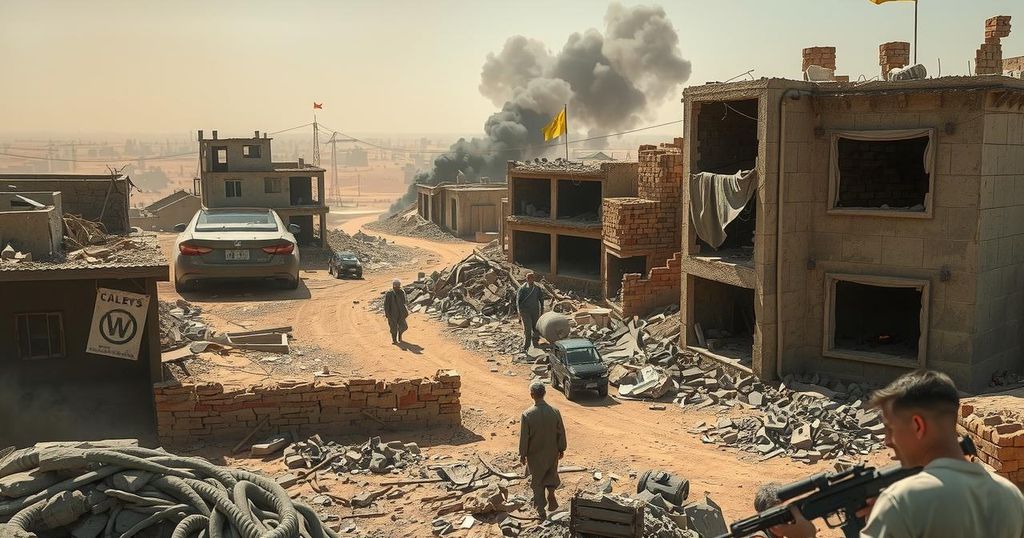Implications of ‘Signalgate’ on Yemeni Civilians Amidst Ongoing Conflict
The “Signalgate” incident reveals severe implications for Yemeni civilians amidst ongoing conflict. While U.S. intelligence discussions primarily focus on diplomatic strategies, the unintended consequences of revealing sensitive information place civilians at greater risk from Houthi reprisals. The situation showcases the urgent need for a re-evaluation of priorities to safeguard humanitarian needs in war-torn Yemen.
The recent revelations about the “Signalgate” scenario, reported by Jeffrey Goldberg of The Atlantic, imply significant repercussions for Yemeni civilians. While much of the media coverage has concentrated on the security breach and implications for U.S. foreign policy, it is crucial to recognize how these discussions adversely impact the lives of those under Houthi control in Yemen. The leaked information may enhance Houthi intelligence, placing civilians at further risk during an already devastating civil conflict.
The ongoing civil war in Yemen, initiated by the Houthis’ 2014 takeover of Sana’a and exacerbated by the Saudi-led coalition’s military intervention, has led to an unprecedented humanitarian crisis. The war has exacerbated malnutrition and deprivation among civilians while the Houthis sustain their authority through oppressive tactics and control over resource distribution. Attacks by the Houthis on maritime vessels have prompted retaliatory strikes from Western nations, resulting in increased civilian casualties.
The leaked chat details indicate the U.S. intent behind recent strikes was not to eliminate the Houthis but rather to reassert freedom of navigation and deter regional aggression. The Houthis, possessing a long track record of enduring airstrikes, may not be significantly threatened by these actions alone. Instead, the absence of a substantial coalition intervention may embolden them to recruit more civilians for military service as they concentrate on capturing Marib’s oil fields, which are vital for their economic sustenance.
Amid these discussions, the integrity of civilian life appears remarkably undervalued. The Atlantic’s decision to redact the name of a U.S. intelligence officer following the identification of a target underscores a troubling ethos surrounding security. Such disclosures not only undermine operational integrity but expose individuals labeled as spies to retributive actions by the Houthis. Assertions surrounding positive target identifications risk prompting escalation in repressive actions against civilians, compounding the perilous atmosphere already prevalent in Yemen.
Warnings have been sounded regarding the potential for increased abductions of civilians, particularly those possessing affiliations with aid and humanitarian organizations. The fact that many civil society members have been forced into silence due to the looming threat serves to further empower the Houthis, who manipulate aid distribution to maintain control. International entities may hesitate to criticize the Houthi regime, fearing retaliatory measures that endanger local facilitators.
In conclusion, the revelations from the “Signalgate” story present a dual-edged sword; while they illuminate failures in U.S. security protocols, they concurrently exacerbate the already harsh realities faced by Yemeni civilians. Their experiences continue to be marginalized amid broader geopolitical discussions. The ethical ramifications of prioritizing Western security over civilian safety must be acknowledged to avoid deepening their plight in the ongoing conflict.
The “Signalgate” revelations underscore the perilous intersection of geopolitical discourse and humanitarian crises in Yemen. The disclosure not only highlights security vulnerabilities within the Trump administration but also jeopardizes the safety of civilians living under Houthi authority. As the conflict continues, it is imperative to prioritize civilian welfare in political discussions to ensure their voices are not silenced amidst the geopolitical machinations that affect their lives profoundly.
Original Source: theconversation.com








Post Comment